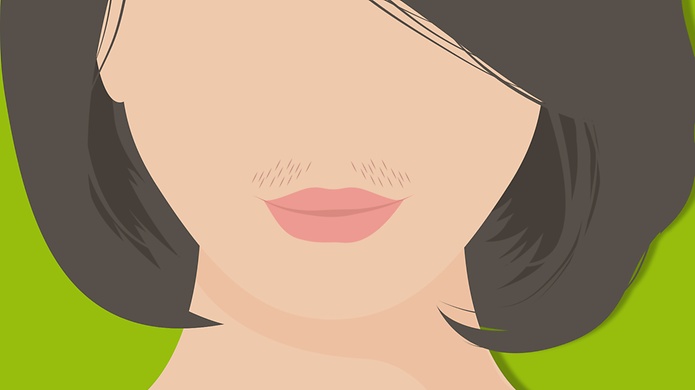- Symptoms of hirsutism
- Causes of hirsutism
- Hirsutism treatments and cure
- Get treatment for hirsutism from LloydsPharmacy Online Doctor

Hirsutism is a term that refers to excessive hair growth in women. If you’re “hirsute” it means you have thick, dark hair on areas of your body that wouldn’t normally have a lot of growth. Hirsutism affects between 5% and 15% of adult women who haven’t been through the menopause.
Hirsutism can be a difficult condition to live with, as it can really impact self-esteem and confidence. The good news is that – aside from hair growth – hirsutism isn’t directly associated with any other serious symptoms.
However, excess hair growth can sometimes be a sign that you have an underlying condition that needs attention. It’s normally worth visiting your GP if you notice unusual, excess hair growth.
Symptoms of hirsutism
The main symptom of hirsutism is thick, dark hair growing in any of the following areas:
- Face
- Neck
- Chest
- Abdomen
- Lower back
- Bottom
- Thighs
Causes of hirsutism
Excess hair growthmore androgens
Most women who experience excess hair growth have a condition affecting the ovaries called polycystic ovary syndrome (PCOS). Other symptoms of PCOS include irregular periods or no periods, weight gain, loss of hair on the head, and acne. Women with PCOS can also struggle with fertility.
In rare cases, hirsutism might be brought on by the following:
- Certain medicines
- Conditions like Cushing’s syndrome or acromegaly
- A tumour that affects your hormones
- Using anabolic steroids
Sometimes, the cause isn’t always clear, but it’s still worth speaking to your GP.
Hirsutism treatments and cure
There’s no cure for hirsutism, but it can be treated and managed. If it’s caused by an underlying condition, you might be able to manage the excess hair growth by treating that condition first.
The first step is to speak to a doctor. They may want to do a blood test to check your hormone levels, so they can determine the cause. If the hair growth is caused by a condition like PCOS, you might be able to get some treatment on the NHS.
Common treatment options for hirsutism include:
- Losing weight if you’re overweight, as this can help to control your hormone levels
- Prescription cream (eflornithine) that slows hair growth on the face
- Certain types of the combined contraceptive pill
You can also manage your hair growth at home by using hair lightening and removal techniques like bleaching, plucking, shaving and waxing. To get rid of unwanted hair on a more long-term basis you could try electrolysis or laser hair removal.
Get treatment for hirsutism from LloydsPharmacy Online Doctor
At Online Doctor, we know excess hair growth can be upsetting, and that it’s not always easy to speak to a doctor about it in person. That’s why we supply eflornithine cream (Vaniqa) for women who have excess hair growth on their face. Applying this to your face twice a day can help to prevent growth.
To learn more about Vaniqa visit our clinic page. You can place in a request by completing a secure online consultation. If our clinicians approve you for this treatment, we’ll deliver it to your closest LloydsPharmacy or your home address – it’s your choice.
References
https://www.nhs.uk/conditions/hirsutism/
https://patient.info/doctor/hirsutism
https://www.nhs.uk/conditions/polycystic-ovary-syndrome-pcos/
https://www.nhs.uk/conditions/cushings-syndrome/
https://www.nhs.uk/conditions/acromegaly/






































